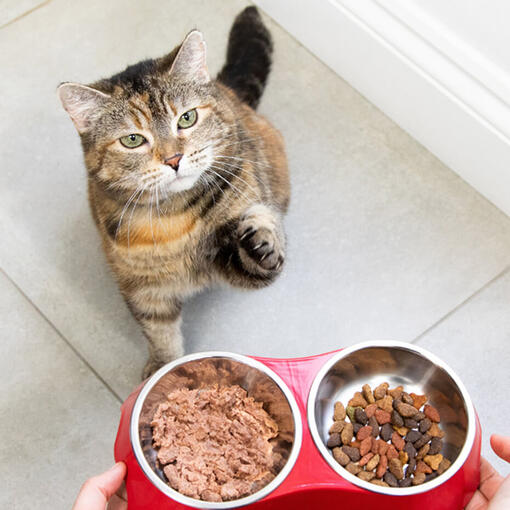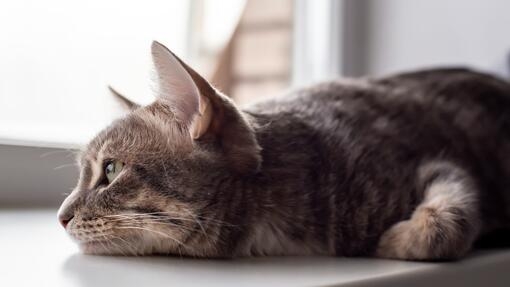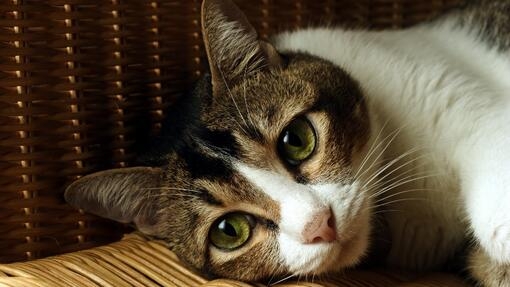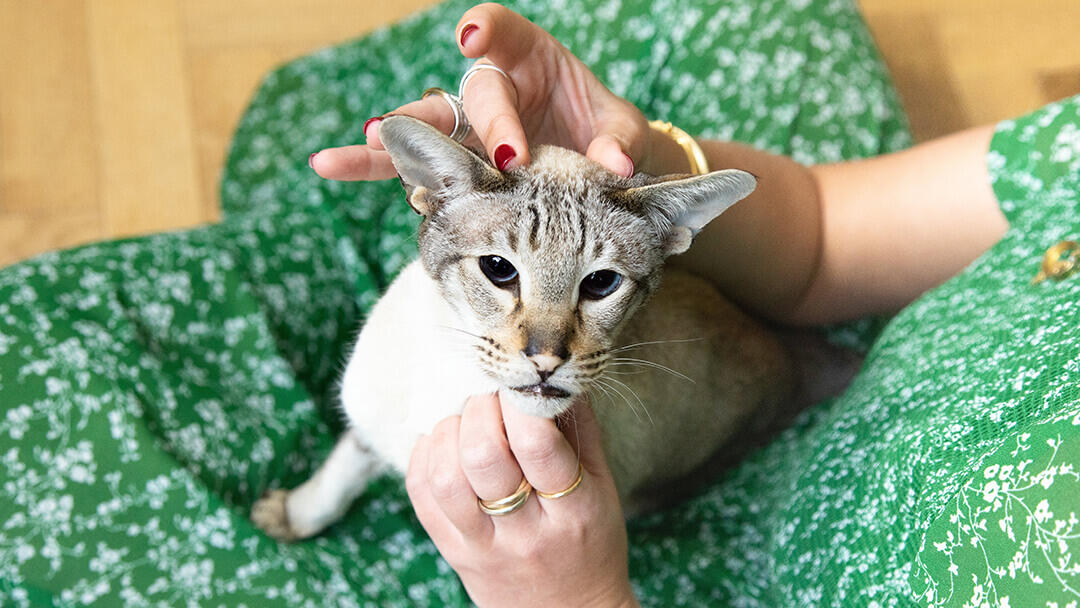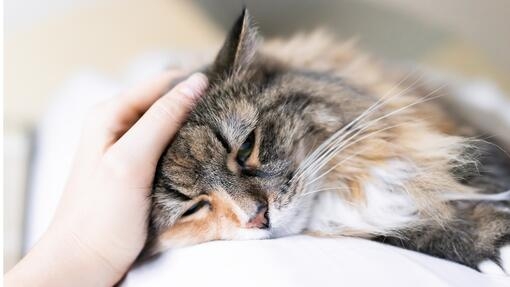
We never like to think of our cats as being unhappy, or feeling sad, but in many ways they can experience feelings in a similar way as we do, and sometimes they can suffer from a feline equivalent of depression.
Lots of things might cause a cat to feel a bit down in the dumps. For example, most cat owners tend to think of their cats as independent creatures, who prefer to be alone. But that is not always true. Some cats need companionship and like to be cuddled and loved, and so sometimes a lack of affection can lead them to feel blue.
Knowing what signs to look out for will help you to determine whether your cat is suffering from a low mood state and what you can do about it. Carry on reading to find out all you need to know about depression in cats.
What causes depression in cats?
Depression in cats has a variety of causes but usually occurs due to changes in their environment, inappropriate or poor care, or lack of appropriate enrichment.
This can include:
- Moving to a new home
- Changes to their existing home
- A change in routine such as owner’s working pattern
- New family members (human, feline or canine)
- A change in their physical health
- Boredom or frustration
- Inability to express natural behaviour
- Loss of a family member (of any species)
Cats can be experts at hiding when they are feeling off-colour so it may be difficult to spot changes in their behaviour. However, if you notice that your cat is a bit quieter than usual, doesn’t seem as interested in everyday activities, may have lost their appetite, might be neglecting their grooming and self-care, or just isn’t as playful or affectionate as usual, keep in mind that this could be a sign of a low mood state. It might also be a sign that your cat is medically unwell, so it is important to book a check-up with a vet.
Can indoor cats get depressed?
Both indoor and outdoor cats can experience depression, although with cats who spend most of their time indoors, it may be easier to notice the above behavioural changes as you tend to see them more often.
Cat depression after getting a new kitten
Cats can become depressed or stressed if a new kitten (or cat) is introduced to their home or territory, and there can be other behaviour issues that can arise in multi-cat households.
Unlike dogs, the majority of cats are not social creatures, and they are far more likely to look on a new feline in the household as an unwanted intruder than they are as a new friend. They may in time learn to like your new arrival – or at least to tolerate them – but it important to understand that this can be a really stressful time for your cat.
There are things you can do to make introducing a new kitten or cat less stressful.
Start by keeping the new kitten or cat in a separate room. This will let them get used to the house – and also for your existing cat to be able to smell them and know they are there without interacting. You can let each cat smell the other by exchanging bedding.
Once your new kitten is comfortable in their new home, they can have more freedom but never force interactions between them – in fact allow them as much distance as you can and as they want.
Make sure both cats always have an easy ‘escape route’.
Make sure you provide at least one more of every resource than you have cats. So if you now have two cats, you need at least three litter trays. And three sets of bowls etc. This will help reduce stress levels and prevent depression.
Make sure your cat still has access to their favourite spots without having to compete for them – and make sure they get just as much of your attention as they always have done.
The use of synthetic facial pheromone Feliway Friends, can help improve feline relationships and reduce conflict.
If you are worried about the behaviour of your cat around a new or existing feline in the house, contact a behaviourist for help.
Signs of depression in cats
Spotting behavioural changes early will give you the best possible chance of helping your cat get back to their normal self as soon as possible. Sometimes the behavioural changes will be very obvious, but on other occasions, the signs may be more subtle.
To help you spot the signs of depression in cats, keep a look out for these behavioural changes:
- Changes to sleeping patterns (sleeping more than usual or else an inability to settle)
- Neglecting washing or claw care (or excessive claw care)
- Lack of interest in play
- Staying outdoors more than usual
- Changes to appetite
- Being overly clingy – or totally aloof and disinterested
- Sudden onset aggression
Excessive Scratching
Cats love to scratch as it keeps their claws sharp. This is also part of their territory marking behaviour - when a cat scratches an object, pheromones are released from the paw pads which get distributed onto the object. This is one way in which cats mark their territory and it helps to make them feel at ease.
If you notice your cat is scratching surfaces more than usual then this could be a sign that your cat is stressed and may even be depressed.
Change in appetite
In some cases of low mood in cats, you may notice that their eating habits have changed. They may start eating more than usual, or their appetite may reduce. However, in some situations, your cat may cease eating altogether and will subsequently start to lose weight.
It is important to note that changes in appetite are also caused by medical issues, so if your cat changes their habits towards eating and drinking, you should book a check-up with your vet.
Vocal clues
Some cats can be extremely vocal when it comes to expressing their emotions; in these cases, a change in this behaviour will be easy to spot. If you notice that your cat is being more or less vocal than usual, then this may be a sign that there is something wrong. Cats that are normally quite vocal, may become quieter and those that are normally quiet may become louder if suffering from depression.
It is important to note that a cat’s purr does not always indicate happiness – even cats that are unhappy or in pain may purr.
Body language
Your cat’s body language will be a tell-tail sign when it comes to figuring out if they are suffering from a low mood state. You will know what your cat looks like when they are happy – so if you notice any changes, you can be sure your cat isn’t happy. Lowered body positions, being more slinky or trying to move inconspicuously, lack of jumping or investigating novelty, unusual tail position, and a change to rubbing against you and other objects (either less or more than usual) can indicate stress, worry or depression.
It is always important to know what your own cat’s ‘normal’ body language and behaviour is like – as that is how you will notice changes.
Grooming changes
Cats are notoriously clean animals, so if you spot your cats grooming routine being neglected this may be a sign that they are suffering from a low mood, anxiety or stress. Cats that suffer from depression can neglect themselves when it comes to grooming, which can lead them to look untidy and messy. Grooming changes can also be a sign of pain and disease in cats, so if you notice this behaviour, contact your vet immediately.
Aggression
Depression, anxiety and stress in cats result in increased aggression and reactiveness. This can include biting and scratching, as well as vocalisations such as growling and hissing.
Lack of interest in play
If your usually playful cat is disinterested in games or their usual toys – or there are changes in their activity levels - they may well be depressed or low.
If your outdoor cat is either spending more time out – or isn’t going out at all – they may well be depressed.
How to make your depressed cat happy?
There are many ways to make your cat much happier, especially when you suspect that they may be feeling down.
First of all, visit your vet. A lot of the behaviours that you see in cats with a low mood state are the same ones that you see in a cat that is in pain or suffering from disease. Your vet will be able to rule out clinical causes for these changes in behaviour.
Once your cat has a clean bill of health, you can start looking at the things you can do to improve their mood.
Outlet for natural behaviour
The most common reason for cats to have a low mood state, be stressed, and appear as if they are depressed, is an inability to be able to express their natural hardwired behaviours.
Think about all the things cats do naturally – they jump, climb, stalk, chase, hunt, and pounce. They find lookout posts to survey their domain and supervise their territory and discover hidey holes for when they want to relax unobserved. These are all things a cat has to do to stay mentally and physically happy and healthy.
When we take a cat into our homes and into our lives, we have to provide them an outlet for those behaviours.
This includes things like: cat trees (which will give opportunities to climb and jump); toys to stalk, chase and pounce on (some of these could be battery powered and others can be toys that you and your cat play together); food dispensing toys (there is no reason all your cat’s food has to come from a bowl); cat caves or sleeping bags (or just a cardboard box)… There is a long list – and with trial and error, you will find what your cat really enjoys.
This is important for all cats – and it is a lot of fun for us too – but it is especially important for indoor cats as they can’t get an outlet for these behaviours by going outside.
Social contact
When it comes to social contact and the giving and receiving of love, all cats are different. Some love to be cuddled, to sit on you and to have your stroke them endlessly. Others like a bit of affection and then are happy to go off for some ‘alone time’. Others need your company and feel secure when you are around but don’t want physical touch. Let your cat lead the interactions so you know you are fulfilling their social needs.
Plenty of playtimes
Cats need plenty of exercise and mental stimulation, so playing hunting and chasing games with toys will keep them busy and help reduce any behavioural problems – especially in the more predatory breeds. This is also a great bonding opportunity with you and your cat.
If you have a cat that reacts to catnip, you can try this too. Catnip is a plant regularly used for its unique calming effect on cats. It is a plant that belongs to the mint family and contains an oil called nepetalactone. When cats rub against or chew cat nip, the oil produces a natural high that is harmless and temporary, but cats find pleasure in this. Catnip can be helpful for cats that suffer from anxiety, or depression, as it can have a calming effect.
Give them plenty of safe spaces
No matter how social your cat might be, they will need some alone time. Cats need places to retreat to that are quiet and safe, where they feel comfortable, can have a wash or a snooze, and where they are not observed especially by other cats (if you have a multi-cat household). Without this, they can become anxious, stressed and depressed. You can experiment with this a bit – as some cats like their safe retreat to be at height, others like to be enclosed, some like to be with the family, while others like total peace.
Living space
Make sure food bowls, water bowls, litter trays, scratching posts and access to the outdoors are always easily accessible – and they don’t have to run the gauntlet of children, dogs or other cats to get to them.
Reduce stressors
Make sure everyone in the family is being ‘cat friendly’. Children constantly picking up cats, people being rough with them, dogs chasing them, over-handling them, or totally ignoring them can all lead to stress, anxiety, and depression.
Cats that are suffering from behavioural issues such as depression may show this in different ways or hardly show it at all. Keeping a close eye on your cat’s overall behaviour will enable you to notice any slight changes. Remember that behavioural changes can also have a medical cause and if you notice any changes in your cat, then you should always seek medical advice from your vet.
Cats can become depressed for many reasons, from illness to life changes, but making sure you keep an eye on their behaviour and overall demeanour will help you make sure they are happy.
While most people think about behaviourists as being for dogs, there are cat behaviourists too and if your vet has given your cat a clean bill of health and you still can’t get to the bottom of your cat’s apparent depression, then talk to a professional.
If you want to learn more about your cat’s behaviour, take a look at our article on why your cat is always hungry, next.

